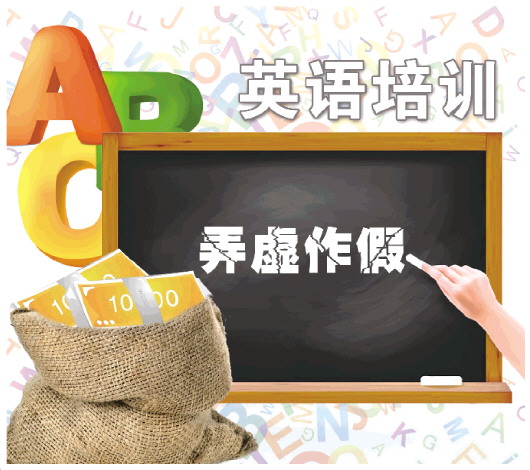
Investigation motive
In recent years, the early education market is extremely hot. Among the various contents of early education, there is a controversial item that attracts parents the most, and that is English training for children. What are the problems in children’s English training market at present? The "Legal Daily" reporter launched an investigation.
English learning courses are held twice a week, one is 8 hours full-day immersion English learning, and the other is 1 hour full-English teaching learning ability training course — — Guo Xiaolin, a little girl in Beijing who is under 3 years old, has to receive such English training twice a week.
According to Guo Xiaolin’s parents’ arrangement, after half a year, Guo Xiaolin will have to take an online English course for half an hour every day.
For children under 3 years old, Chinese learning is still in the initial stage. Is it too early to learn English so frequently?
"Although the children are now the youngest in the class, most of the other children are under 4 years old. After more than a month’s study, children have been able to speak English independently. We just want to cultivate her interest in English. " Lin Zhao, Guo Xiaolin’s mother, thinks that journalists are "too ignorant".
At present, there is a new wave of learning English in the society. In this round of upsurge, a major feature is that "English starts with dolls", and the trend of younger English learning is becoming more and more obvious.
According to a survey conducted by the reporter of Legal Daily, in the children’s English training market, English training institutions have launched all kinds of new slogans, which make parents dazzled. Some parents are willing to pay no matter how high the tuition fees are, out of the psychology of not letting their children lose at the starting line. However, the training effect is not ideal.
Training institutions are seriously utilitarian.
Lin Zhao, who works in a public institution in Beijing, believes that children should be given a good language foundation from an early age, which is her main purpose in arranging English teaching for her daughter. For Lin Zhao’s cousin Tian Le, who is currently working in a consulting company in Shanghai, it is a "helpless choice" to arrange English training for her son who just turned 5.
"Two years later, my children will face a young age, and the competition to enter a good private school is very fierce. English is a compulsory test. The teacher asked the child ‘ What colour do you like’ If the child answers ‘ Blue’ There is basically no score, and you must answer completely ‘ I like blue’ . Therefore, I can only let my children participate in professional institutions or targeted training. " Dengaku explained the reason of "helplessness" to reporters through WeChat.
Dengaku told reporters that before that, he went to a large-scale national chain of children’s English training institutions to register his children. Knowing that the child was 5 years old, the teacher immediately asked, "Why did you come so late? Other children have been studying for two years. "
In another training institution, Tian Le and his wife auditioned for an English class for foreign teachers, and found that almost a dozen children in the class were about 5 years old. These children had studied for a semester and had learned 26 letters.
According to the White Paper on the Present Situation and Trends of English Learning for Children and Adolescents in China published by China Youth Research Association and the Research Branch of Subject English Education of Beijing Education Association in 2016, nearly 70% of children start learning English before the age of 5.
In view of the current hot phenomenon of children’s English training industry, Liu Tiantian, who has been engaged in teaching research and development in a children’s English training institution in Chaoyang District, Beijing for three years, said: "As far as the enlightenment English market is concerned, young convergence is more popular. Everyone wants to train their children into geniuses, so there will be business opportunities."
However, parents have no idea whether it is useful for their children to learn English so early. "It may be effective, but it may not be effective immediately." Lin Zhao said that the crux of the problem is that there is no evaluation. On the surface, my daughter’s English performance and oral expression ability have not changed significantly.
He Xinyun, a Beijing citizen, also enrolled his 6-year-old son in a children’s English training class. However, his idea is to "let the children have a place to play." As for the training effect, He Xinyun has no bottom in his heart. "I can’t see the effect now, maybe it will be helpful in the future." He Xinyun told reporters that many parents around him hold the same mentality and worry that if they don’t learn English early now, they will lose to their peers in the future.
The reporter visited and found that children’s English training institutions often take the form of holding regular open classes to give parents "reassurance" — — Invite parents to observe students in class. "This kind of open class is taught by better teachers in the organization and will be rehearsed in advance." Miss Chen, who works as a course consultant for an international children’s English training brand in Beijing, said that open classes can’t reflect the real situation to a large extent.
In addition to open classes, children’s English training institutions will also take pictures of ordinary classes for parents to check. However, Ms. Chen said that this situation is also selective, and the video shown to parents in the training class is likely to be "preferred."
"Looking at English training at this age, most parents look for training institutions for their children. The primary purpose is to enhance their children’s competitiveness, that is, to cope with the choice of exam-oriented education; Secondly, I hope that children will learn the language in an authentic way. " Bai Chen, who worked as a middle-level manager in a children’s English training institution for two years, said.
Wang Li once worked in a children’s English training institution in Dali, Yunnan, but later resigned because of his work philosophy. Wang Li said that the educational philosophy of training institutions is too utilitarian. "Their philosophy is to let children form a conditioned reflex of seeing apple say Apple and the sun say Sun, without paying attention to how to inspire children’s interest in English."
In the past year, Wang Li commented on the utilitarian children’s English training industry: "It is not surprising that this industry is seriously utilitarian. A group of parents know nothing about children’s English education and let these institutions cheat them with some tricks, thinking that their children have really learned something. In fact, parents who have the ability and conditions can complete the English enlightenment education for their children themselves. "
Regarding the utilitarian phenomenon of training institutions, Liu Tian analyzed: "Whether online or offline training, its purpose is to cultivate children’s interest in English learning, but the current English consideration standard is reflected by taking exams, which is in contradiction with purely cultivating English learning interest. Parents may consider their children’s interest in learning in the early stage, but with the pressure of further studies, parents will also urge their children to learn more test-taking skills, which will lead to the phenomenon that students learn knowledge ahead of time. "
"For example, when parents go to a training institution, the first concern is how much their children can learn, which also gives birth to the phenomenon that training institutions introduce various efficient learning methods to attract attention. There has always been a problem in the English training industry, that is, teaching and learning. " Liu Tian further explained to the reporter, "For example, if everyone recognizes reading teaching, then parents and teachers will pay more attention to the cultivation of children’s reading habits, and this model has a far-reaching impact on children."
The entry threshold for training teachers is low.
Teachers are one of the most important links in learning. However, the teaching staff is also a controversial part of children’s English training industry at present.
According to a survey conducted by the reporter of Legal Daily, when choosing a training institution, many parents will evaluate the quality of teachers in the training institution by price.
"In developed countries, teachers in the stage of children’s education have relatively high academic qualifications. In China, on the contrary, teachers in the younger education stage are generally low-educated. " Chen Hao, the dean of an English school in Beijing, told reporters that compared with IELTS and other courses, the salaries of teachers in charge of children’s English courses are generally the lowest, largely because of their low academic qualifications. In this context, parents should see the status quo clearly, and don’t blindly link teachers with prices, because high prices may not be able to find experts.
Can students who have graduated from English major be training teachers? Wang Li gave a positive answer, "even if this person doesn’t have any knowledge reserves related to early childhood education, as long as he is an English major."
On this issue, Liu Tiantian, an English major, is also frank. "The main reason is that it is difficult to find a counterpart job, so it is not difficult to enter the children’s English training industry."
"The low threshold of teachers is not a big problem. The main problem is the cultivation of teachers. Training institutions have to make money, and everything needs to be calculated. " Liu Wei said.
So, are training institutions willing to work hard on teacher training? Liu Tian Tian said: "It depends on what training institution it is. As far as my training institution is concerned, new teachers have to attend induction training and have teaching and research every week. In fact, many teachers in training institutions are taught step by step by old people with new people. If the new teachers learn more by themselves, they will also become good teachers. Teachers in the education and training industry are very different from teachers in public schools. They need to keep learning and be more professional. "
For some training institutions claiming that teachers have received overseas education, Mu Ming, who once worked in an English franchise company of a certain subject, commented: "Teachers who have received overseas education majors are almost in single digits, but their sales skills are very strong, and their ability to fool is very strong."
Muming said that after he resigned from a subject English franchise company, he entered another children’s English training institution. "The foreign teachers hired by this training institution are all from diploma mill, and their personal qualities are not high. Almost all foreign teachers have no work visas. Due to poor treatment, the loss of teachers is very serious and the risk factor is very high. "
In the investigation, the reporter of Legal Daily also found that foreign teachers seem to be the trump card for children’s English training institutions to attract popularity, and their charging standards largely depend on the class hours taught by foreign teachers. A staff member of a children’s English training institution in Beijing told the reporter that the reason why it is cheaper than other institutions is that there is only one foreign teacher class in one semester. "If we teach foreign teachers all the time and collect such a little money, we can’t even earn the rent back."
According to the Permit for Foreign Experts to Work in China issued by official website, the State Administration of Foreign Experts Affairs, foreign experts working in China must hold the Foreign Expert Certificate. Applicants who have obtained this certificate must have at least a bachelor’s degree or above, more than two years of relevant teaching experience, and have TESOL (usually referring to teaching non-native English speakers who emigrate to English-speaking countries) or TEFL (usually referring to teaching non-native English speakers in non-English-speaking countries) certificates.
However, at present, most foreign teachers in English training institutions in the market do not hold relevant qualification certificates. An insider of an education and training institution, who asked not to be named, told reporters that many foreign teachers in English training institutions are even foreigners who come to China to teach in training institutions on a part-time basis.
As a result, the turnover rate of teachers in some English training institutions is high, and the quality and stability of teaching are difficult to guarantee. "I didn’t go to class every month or two, and the foreign teacher has become another person." The above insiders said that this phenomenon is not uncommon in the industry.
"I have contacted more than 20 foreign teachers. They all come to make a living. Every resume says that they have teaching experience, but when they are in class, nothing will happen." Bai Chen said, "Even so, some parents especially believe in foreign teachers, and some parents want their children to attend all foreign teachers’ classes. In fact, at present, the education level of foreign teachers in some training institutions is not high, and most of them have not received higher education in their own countries. Imagine how a person who may not even graduate from high school can teach children. "
Chen Hao also expressed similar views to reporters. Some foreign teachers speak English with a strong local accent, and it is difficult for children to correct it after imitation. Some foreign teachers are not only not properly trained in teachers’ skills, but also unable to be systematic and rigorous in teaching. This teaching effect can be imagined. If you blindly believe in foreign teachers regardless of your child’s level, you can only spend a lot of money practicing listening and killing time.
"Of course, there are also one-on-one foreign teachers whose level is very high. These foreign teachers are generally professionally trained and have access thresholds." Bai Chen added that parents should not pay too much attention to whether there are foreign teachers when choosing training structures, because some training institutions just want to create a stunt and find a few foreigners to put on a show there.
It is most important to recruit students to collect tuition fees.
Compared with other subjects, it is difficult to find a unified evaluation standard for the effect of English learning for young children, which increases the difficulty for parents and society to evaluate English training institutions for young children, but lowers the threshold for businesses to enter this market. The resulting problem is that children’s English training institutions are mixed, and it seems difficult to avoid chaos.
"Every Friday night, I get calls from several English training institutions, asking me to take my children to audition." Cheng Nan, who is currently doing Japanese purchasing business in Beijing, told reporters that her daughter is now in a large kindergarten class, and since she went to kindergarten, this phone call has never stopped. "I don’t know when I left their contact information. These training institutions have taken pains to help you make an appointment for an audition. No matter what you ask, they can promise, and you are embarrassed to refuse. "
Like Cheng Nan, many parents are dragged into English training institutions by persistent phone calls and "free audition".
Zhao Lin took her daughter to listen to English after class, and was taken out by the teacher alone to discuss it in detail. However, in Cheng Nan’s view, one-on-one detailed discussion is already a good "treatment". "After our audition, almost every parent will be surrounded by two or three staff members. They took out the price list and urged you to register on the spot like a barrage. "
Cheng Nan enrolled her daughter in a training class. The tuition fee for 22 weeks is 8,700 yuan, which is nearly 130 yuan per hour per week on average.
Expensive tuition is a common feature of the current children’s English training market. The reporter’s investigation found that many children’s English training institutions spend more than 100 yuan per hour, and some even reach 300 yuan, and the annual courses cost tens of thousands of yuan.
Sun Ming used to work in a well-known children’s English training institution. She said: "The most important thing for the school is demonstration classes and open classes once or twice, because these classes are to attract parents to pay. Therefore, every time after an open class or demonstration class, all teachers will be pulled out to persuade parents to pay. "
Persuading parents to pay is called "kicking the bill" in the English training industry. "As long as ‘ Kick single ’ If you succeed, the school will receive a lot of tuition fees, and the teacher will get the corresponding commission. " Sun Ming said that in children’s English training institutions, we can often see such a scene: a teacher who is in class or preparing lessons suddenly leaves his work at hand and rushes to the parents who have just left the observation class. When he sees the parents, his eyes will shine and he will "kick" when he pulls a parent. He will talk endlessly, and many parents will never give up until they pay the money on the spot.
For parents, what they spend money on is the quality of education, but for many children’s English training institutions, the quality of education is far less important than expanding the market and attracting students.
"In that demonstration class, although the teacher’s actions and voices were exaggerated, at least the children felt that they were playing games, but it was completely different when they really started class." Cheng Nan said that the teacher was not "crazy" at all after the class started. Every class, more than a dozen children sit in a row, the teacher keeps talking in front of the blackboard, and the children sit quietly and listen. "It’s really boring to learn six or seven words and homework in one class and let the children go home and listen to English recordings."
Less than a month later, Cheng Nan’s daughter said that she didn’t want to have any more English classes.
"If you are not satisfied, return it." This is a promise made by many businesses to customers, but in the children’s English training market, "returning goods" is almost impossible.
Cheng Nan tried to get a refund because her daughter didn’t want to take any more English classes. Find a teacher, the teacher tried every means to persuade Cheng Nan to let her daughter continue her studies. After several times of communication, the teacher gently reminded Cheng Nan that it was clearly stated in the agreement signed at that time that parents could ask for a refund within a few days after payment, but the school would deduct about 10%, and as time went on, the proportion that could be returned became less and less. There is no possibility of refund after a certain period of time.
"During the communication with the teacher, I missed the time limit for getting a refund. However, when paying, they won’t give you time to read the agreement carefully. Usually, before you finish reading a page, the salesperson has turned to the signature page, and you have no idea what is in the agreement. " Cheng Nan said.
A survey by the reporter of Legal Daily found that "difficulty in refunding" is a major contradiction in the children’s English training market in recent years. When many parents are dissatisfied with the quality of education in training institutions and want to get a refund, they usually encounter all kinds of "kicking the ball" and eventually miss the time limit for refund. Others have no choice but to give up the refund because they can’t provide evidence of "poor education quality".
Sun Ming told reporters that for parents who want to get a refund, the training institutions adopt roughly the same method: they can hide, they can prevaricate, and if they can’t, they will take the method of robbing Peter to pay Paul. "Because these are not the focus of training institutions, the focus of training institutions is to accept students".
As for online English teaching, which has been popular in recent two years, Bai Chen believes that many online English education are celebrity endorsements, and online English training institutions have invested a large proportion in the marketing. However, the wool is on the sheep, and this part of the investment is ultimately paid by the parents.
Reporter Zhao Li Intern Dai Menglan





